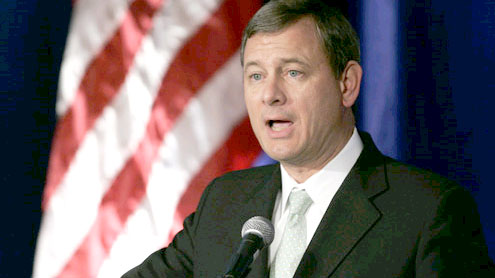 Religious organizations won a landmark victory Wednesday as the Supreme Court held that churches have the right to make employment decisions free from government interference over discrimination laws.
Religious organizations won a landmark victory Wednesday as the Supreme Court held that churches have the right to make employment decisions free from government interference over discrimination laws.
In a 9-0 decision, the Supreme Court endorsed for the first time the “ministerial exception” to state and federal employment discrimination laws while rejecting the Obama administration’s argument that churches should be treated no differently than other employers.“The interest of society in the enforcement of employment discrimination statutes is undoubtedly important. But so too is the interest of religious groups in choosing who will preach their beliefs, teach their faith, and carry out their mission,” said Chief Justice John G. Roberts Jr., who wrote the court’s 39-page opinion.
“When a minister who has been fired sues her church alleging that her termination was discriminatory, the First Amendment has struck the balance for us,” Chief Justice Roberts said. “The church must be free to choose those who will guide it on its way.”Allowing former employees to file anti-discrimination lawsuits “could end up forcing churches to take religious leaders they no longer want,” he said.Advocates of religious liberty hailed the ruling as a crucial win for churches in the face of government encroachment.
“We are pleased that the Supreme Court rejected the Obama administration’s profoundly troubling claim of power over churches, and glad to see that the Supreme Court has stayed out of the Lutheran Church’s affairs and allowed its internal rules as a body of believers to stand,” said Ken Klukowski, director of the Center for Religious Liberty at the Family Research Council.The case, Hosanna-Tabor Evangelical Lutheran Church and School v. Equal Employment Opportunity Commission, centered on a former teacher, Cheryl Perich, who argued that she was fired from the Missouri Synod Lutheran school in violation of the Americans with Disabilities Act.
Mrs. Perich had been promoted from a temporary lay teacher to a “called” teacher in 2000, but had taken leave after being diagnosed with narcolepsy. School officials refused to hire her back because they had already replaced her with a substitute for the year. After she threatened to sue to get her job back, the Redford, Mich., church fired her, saying using secular courts to solve an interchurch issue violated its teaching on resolving such disputes.After the EEOC sued on her behalf, a federal judge threw out the lawsuit, holding that her firing fell under the law’s ministerial exception. But the 6th U.S. Circuit Court of Appeals ruled in her favor, holding that the ministerial exception failed to apply because Mrs. Perdich taught primarily secular subjects.
The high court overturned the Circuit Court, concluding that the constitution’s free exercise and establishment clauses protect a church’s ability to select its leadership and lower-level employees.The EEOC had argued that the ministerial exception would give churches “unfettered discretion” to violate employment laws, such as by hiring children or undocumented workers, or retaliating against employees who report criminal misconduct. The court refused to rule on those issues, expressing “no view on whether the exception bars other types of suits.”
“It is enough for us to conclude, in this, our first case involving the ministerial exception, that the exception covers Perich, given all the circumstances of her employment,” Chief Justice Roberts said.The Becket Fund for Religious Liberty, which argued the case before the Supreme Court, called it “the most important religious liberty case in 20 years.”“The message of today’s opinion is clear: The government can’t tell a church who should be teaching its religious message,” said Luke Goodrich, Becket deputy national litigation director, who called the decision “a rebuke to the government, which was trying to regulate how churches select their ministers. – Thewashingtontimes











